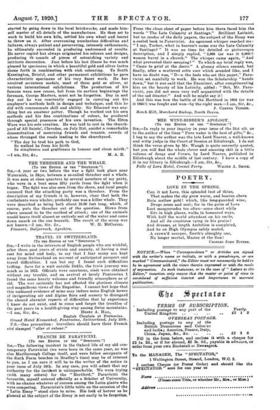FRANCIS DE PARAVICINI.
[To THE EDITOR OF THE " SPECTATOII."] gia,—The following incident in the Oxford life of my old con- temporary Paravicini (we were born in the same year, as was also Marlborough College itself, and were fellow occupants of the Sixth Form benches in Bradley's time) may be of interest to you, as I am sure it will be to the writer of the notice in your issue of July 10th. In any case, you will admit that my authority for the incident is unimpeachable. We were trying (with many others) for the "Hertford," Paravicini the favourite, myself entered officially as a Scholar of University, with no chance whatever of success among the Latin giants who were competing. Paravicini's little table on the occasion of the "Latin Essay" stood close to mine. His look of horror as he glanced at the subject of the Essay is not easily to be forgotten. From the clean sheet of paper before him there faced him the words "The Late Calamity at Santiago." Brilliant Latinist, but no reader of the daily papers, the subject of the Essay was a sealed book to Paravicini. An agonized whisper reached me : "I say, Tucker, what in heaven's name was the Late Calamity at Santiago?" It was no time for detailed or picturesque description, and I simply replied, "3,000 (or was it 6,000i) women burnt in a church." The whisper came again, "And what prevented their escaping?" To which my brief reply was, " Came to grief at the doors." A gloomy silence ensued, but finally, after a muttered sotto voce which sounded like, and I have no doubt was, "D—n the fools who set this paper," Para- vicini set manfully to work. He won the Scholarship "hands down," but it was said that the Examiner, after complimenting him on the beauty of his Latinity, added : "But, Mr. Para- vicini, you did not seem very well acquainted with the details of the sad disaster." And well he might say it !
And this was how the battle of the Hertford in 1864 (or was it 1865?) was fought and won—by the right man.—I am, Sir, &c.,


































 Previous page
Previous page